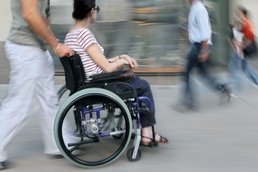Disabled tenants to fight bedroom tax in the High Court
Disabled tenants have been granted a judicial review of the Government’s controversial decision to cut housing benefits to people with so called ‘surplus rooms’.

The controversial bedroom tax, which came into effect this month, taxes people living in social housing with more bedrooms than occupants. Under the new policy, people with one ‘spare’ bedroom in their council or housing association home lose 14 per cent of their housing benefit and those with two or more lose 25 per cent.
Severely disabled children, foster carers and soldiers who are away serving overseas are exempt from the tax. Disabled people who need a room for their overnight carer to sleep in are also exempt but the tax still applies to couples where one has a disability and the couple cannot sleep in the same room.
A number of disabled tenants, represented by the lawyers Leigh Day, have challenged the new legislation and the Government recently failed in its attempt to prevent legal action.
A judicial review of the decision was granted permission to proceed in the High Court, which will be heard in May.
Ugo Hayter from Leigh Day said: "This is an excellent result and the first step in over ruling what we believe is an unfair piece of legislation which has disproportionate negative consequences on disabled people and is therefore discriminatory.
“We urge the Government to think again and not to punish the most vulnerable for what are negligible savings, the Court has ordered an urgent hearing at the beginning of May, we hope that this will mean that the terrible anxiety our clients and many others are currently facing will be short-lived.”
Sue McCafferty from the 'We Are Spartacus' grassroots network, which has been campaigning against the welfare reforms for people with disabilities said: “The policy and the legislation underpinning the 'bedroom tax' are fundamentally flawed and it was evident from the Government's own Equality Impact Assessment that the regulations would have a disproportionate impact upon sick and disabled people.
“We at Spartacus are delighted that the flaws of this policy will be examined and, we hope, that the profound distress caused to those affected will soon be over.”
The disabled tenants challenging the bedroom tax claim it is discriminatory, as it will have a far greater ‘devastating’ impact on disabled people than on non-disabled recipients of the benefit.
The law firm is challenging new regulation B13 introduced into the Housing Benefit Regulations 2006, which will see a single person or a couple with no children having their housing benefit reduced by 14 per cent where they occupy a two bedroom home and by 25 per cent if they occupy a home with three or more bedrooms.
Leigh Day is arguing this will have a serious impact on disabled housing benefit claimants including their client Jacqueline Carmichael who lives with her husband in a two bedroom housing association flat. Mrs Carmichael has spina bifida and is severely disabled.
Mr Carmichael provides her with care throughout the day and night. Mrs Carmichael’s condition means that she has to sleep in a hospital bed with an electronic pressure mattress and has to sleep in a fixed position.
Mr Carmichael cannot sleep in this bed with her as it is not large enough for two people and his movements at night could cause harm. There is not enough space in her bedroom for a second bed so Mr Carmichael sleeps in a second bedroom.
Mr and Mrs Carmichael say they cannot afford to make up the 14 per cent benefit reduction, which has been imposed.
Mr Rourke is a widower. He is disabled and uses a wheelchair. He is a council tenant and lives in a three-bedroom bungalow.
His stepdaughter is also disabled with a rare form of muscular dystrophy, a degenerative condition that attacks the lungs, heart and muscles.
She is currently a university student in her first year of a two-year web design degree. She lives in halls of residence during term time but returns home for the full summer vacation, at holiday periods and at weekends when she can.
The third ‘bedroom’, as defined by the Government, in Mr Rourke’s home is a box room measuring 8 x 9 feet which he requires to store his equipment including a hoist for lifting him, his power chair and his shower seat.
Mr Rourke has enquired in the social rented sector about the availability of two bedroom properties, which are suitable for wheelchair use, and there are none.
Mr Rourke also says he cannot afford to make up the 14 per cent benefit reduction.
To vote on this controversial issue, please see our debate www.homecare.co.uk/news/article.cfm/id/27/should-disabled-adults-be-exempt-from-the-bedroom-tax
Latest News
 29-Jul-24
Dementia Bus gives carehome.co.uk staff insight into life with dementia
29-Jul-24
Dementia Bus gives carehome.co.uk staff insight into life with dementia
 27-Jul-23
UK's top home care agencies in 2023 revealed
27-Jul-23
UK's top home care agencies in 2023 revealed
 30-Nov-22
A quarter of older people keep their falls secret from family
30-Nov-22
A quarter of older people keep their falls secret from family
 29-Nov-22
'Covid-19 has not gone away' say terminally ill
29-Nov-22
'Covid-19 has not gone away' say terminally ill
 28-Nov-22
IT consultant who received poor care opens 'compassionate' home care business
28-Nov-22
IT consultant who received poor care opens 'compassionate' home care business